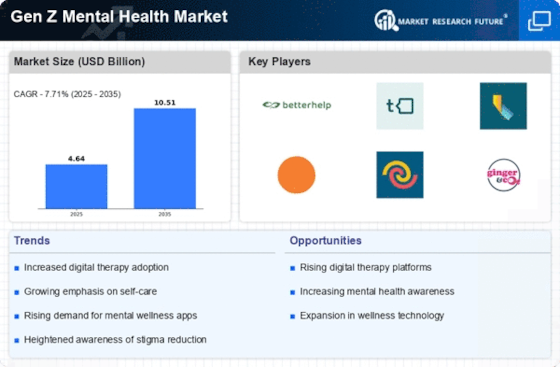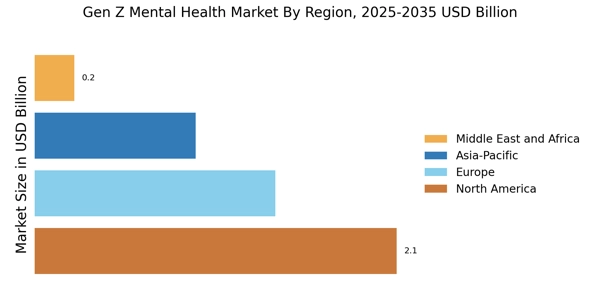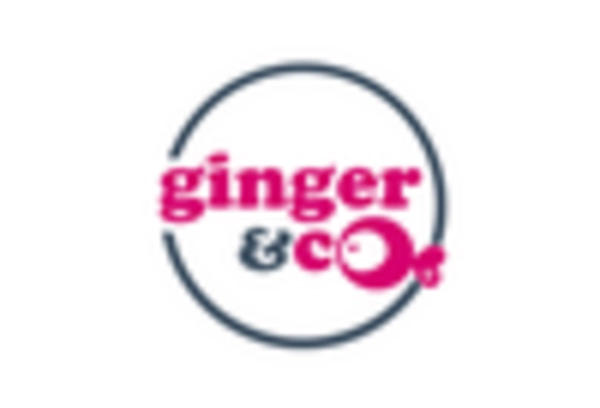Rising Awareness of Mental Health Issues
The increasing awareness surrounding mental health issues among Gen Z is a pivotal driver in the Gen Z Mental Health Market. This demographic has shown a heightened sensitivity to mental health challenges, with surveys indicating that approximately 70% of Gen Z individuals recognize the importance of mental well-being. This awareness has led to a surge in demand for mental health resources, including therapy apps and online counseling services. As a result, businesses are increasingly focusing on developing products tailored to the unique needs of this generation. The Gen Z Mental Health Market is thus witnessing a transformation, as companies strive to create solutions that resonate with the values and experiences of young individuals.
Cultural Shifts Towards Open Conversations
Cultural shifts towards open conversations about mental health are driving change within the Gen Z Mental Health Market. This generation is more willing to discuss mental health openly, challenging the stigma that has historically surrounded these issues. Surveys indicate that over 80% of Gen Z individuals believe that talking about mental health is essential for overall well-being. This cultural shift is encouraging businesses to create environments that foster dialogue and support. As a result, the Gen Z Mental Health Market is evolving to include initiatives that promote mental health literacy and encourage open discussions, ultimately contributing to a more supportive community.
Influence of Social Media on Mental Health
The influence of social media on mental health is a double-edged sword that significantly impacts the Gen Z Mental Health Market. While social media platforms can exacerbate mental health issues through comparison and cyberbullying, they also serve as vital spaces for support and community building. Approximately 75% of Gen Z individuals report using social media to connect with others facing similar mental health challenges. This duality has led to a demand for resources that address both the positive and negative aspects of social media. Companies are increasingly developing tools that promote healthy online interactions and provide support networks, thereby shaping the landscape of the Gen Z Mental Health Market.
Increased Focus on Preventative Mental Health Care
The Gen Z Mental Health Market is experiencing a shift towards preventative mental health care. This generation is increasingly prioritizing mental wellness, seeking proactive measures to maintain their mental health rather than solely addressing issues as they arise. Research indicates that nearly 65% of Gen Z individuals engage in activities aimed at enhancing their mental well-being, such as mindfulness practices and wellness workshops. This proactive approach is influencing the types of services and products offered in the market, with a growing emphasis on preventative strategies. Consequently, businesses are adapting their offerings to align with this trend, fostering a culture of mental health awareness and prevention.
Integration of Technology in Mental Health Solutions
The integration of technology into mental health solutions is reshaping the Gen Z Mental Health Market. With the proliferation of smartphones and digital platforms, Gen Z is more inclined to seek mental health support through apps and online platforms. Data suggests that over 60% of Gen Z individuals prefer digital solutions for mental health management. This trend has prompted companies to innovate and develop user-friendly applications that provide access to therapy, mindfulness exercises, and community support. The convenience and accessibility of these digital tools are likely to drive further engagement, making technology a cornerstone of the Gen Z Mental Health Market.

















